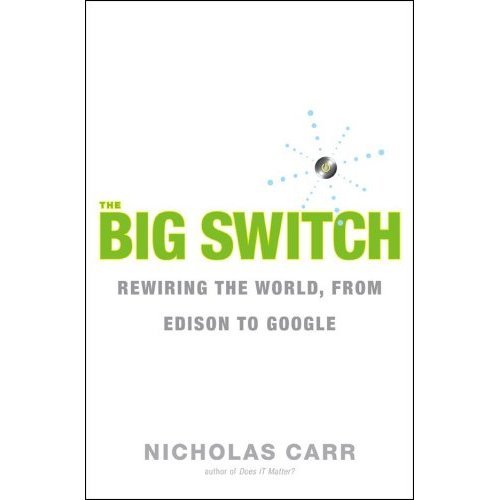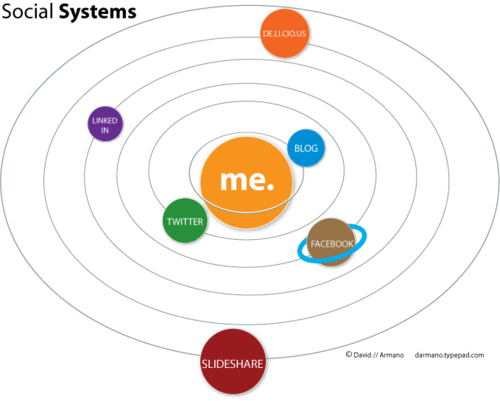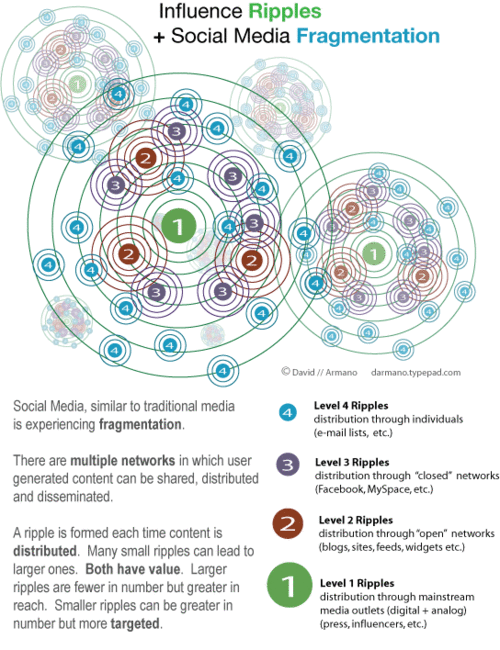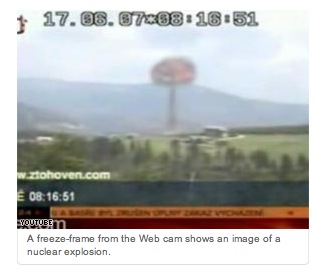This was January 2008 | « December 2007 | Main | February 2008 »
The Medium is the Mind
Posted on Saturday, January 19, 2008
Another good reason why to read below book, the following quote comes from the author's blog:
"The medium is the mind," I write toward the end of The Big Switch, arguing, as others have before, that the tools we use to gather, store, and analyze information inevitably exert a strong influence over the way we think. As the internet becomes our universal medium - what the director of the Annenberg Center for the Digital Future terms "a comprehensive tool that Americans are using to touch the world" - its technical characteristics also begin to shape, slowly but inexorably, the workings of our memory and our other cognitive processes.
A good way to spent a couple of days with the flu
Posted on Thursday, January 17, 2008

Read The Big Switch. Really, you won't regret it. Gave me the same inspiration as reading The Google Story a couple of years ago. What the future of the Internet has in store for us...
There goes another space based solution
Posted on Thursday, January 17, 2008
Just watching the keynote by SJ. As could be expected, there turns out to be a good reason why the iPhone doesn't carry a GPS receiver. There is a terrestrial way to get your position with less battery expenditure. Its Skyhook Wireless, they even call it WPS (Wi-Fi Positioning System). Combined with Google's triangulation of cellular network antenna's, the positioning is apparently considered to be accurate enough. There goes the market for Galileo. Reminds me of Iridium and the promises of cell phones by satellite, which was totally swepted away due to the proliferation of terrestrial networks.
Are Humans in Space worth investing
Posted on Friday, January 11, 2008
Via NASAwatch comes this story in the NYT about the question: "Is Space Exploration Worth The Cost?"
The answers by the panelists are certainly worth reading, but what I find interesting is that I more and more tend to read these main articles just to see what the ensuing discussion in the comments is about. In this case, the fact that all panelists have careers tied to the space industry certainly doesn't help to give the article a feel of objectivity, as shown by the first row of comments . Here is another comment worth reprinting:
Economists generally think competition is a good thing, but suddenly once we’re out of the atmosphere everyone is going to cooperate and everything will be fine? All the national governments will join hands, and do everything efficiently?
Without some kind of national/corporate race in space — which is impossible due to U.N. treaties — there will never be much beyond LEO.
I am not so sure the UN treaties are the main problem though, cause even without these treaties, what would be the commercial incentives on which businesses are willing to invest +billion dollars for a market of consumers that's...well...back on Earth?
Evolution in Electricity Tubes
Posted on Thursday, January 10, 2008
Another nice video from TED, this one from a fellow Dutchman: Theo Jansen (thanx Nadav).
Space Metaphors 2.0
Posted on Thursday, January 10, 2008
Following an earlier mention of space metaphors, yesterday I found this video of Jonathan Harris at TED earlier in 2007. Very nice work! Half way through the video you'll understand the reason for posting it under the title 'space metaphors' (via VanElsas)
Solar Cycle 24
Posted on Thursday, January 10, 2008
Some topics passing by:
- In case you missed it, Solar Cycle 24 just started
- MDA (Canada's biggest satellite business) gets sold to US defense contractor
- The Arts Catalyst blog has recently emerged. From their blog:
The Arts Catalyst commissions art that experimentally and critically engages with science. We bring together people across the art/science divide and beyond to explore science in its wider social, political and cultural contexts. We produce provocative, playful, risk-taking projects to spark dynamic conversations about our changing world.
- A lot of good text over at Edge, following this year's question 'What have you changed your mind about? why?'. Sofar, this entry by Douglas Rushkoff stood out:
The Internet
I thought that it would change people. I thought it would allow us to build a new world through which we could model new behaviors, values, and relationships. In the 90's, I thought the experience of going online for the first time would change a person's consciousness as much as if they had dropped acid in the 60's.
I thought Amazon.com was a ridiculous idea, and that the Internet would shrug off business as easily as it did its original Defense Department minders.
For now, at least, it's turned out to be different.
Virtual worlds like Second Life have been reduced to market opportunities: advertisers from banks to soft drinks purchase space and create fake characters, while kids (and Chinese digital sweatshop laborers) earn "play money" in the game only to sell it to lazier players on eBay for real cash.
The businesspeople running Facebook and MySpace are rivaled only by the members of these online "communities" in their willingness to surrender their identities and ideals for a buck, a click-through, or a better market valuation.
The open source ethos has been reinterpreted through the lens of corporatism as "crowd sourcing" — meaning just another way to get people to do work for no compensation. And even "file-sharing" has been reduced to a frenzy of acquisition that has less to do with music than it does the ever-expanding hard drives of successive iPods.
Sadly, cyberspace has become just another place to do business. The question is no longer how browsing the Internet changes the way we look at the world; it's which browser we'll be using to buy and sell stuff in the same old world.
Paul Saffo at the Long Now
Posted on Monday, January 7, 2008
If you're in the SF Bay area, Paul Saffo is giving a talk at the Long Now Foundation this Friday.
Social Systems
Posted on Monday, January 7, 2008

Space makes for great metaphors, but sometimes they can seem just a little bit off. The image above I read, but what about this text:
The related concept of a "social graph" is difficult to explain, but social systems is easy. Many of us are now managing multiple social ecosystems. If you think of these as planets—some rotate in closer proximity to us. We "warm" them with our attention frequently. Others may orbit at further proximities—but they are still in our social systems. When we abandon a social ecosystem that we can no longer sustain, it drifts away from our orbit and dies. Many of us have had these experiences.
The blogpost does link to another interesting post about Influence Riples though. The pond metaphor seems to be better suited here:

This post's comments also includes another metaphor:
The ripples metaphor is fun, but it is passive and therefore has metaphorical limits.I prefer a bonfire metaphor.
Traditional push-marketing is like a huge organised bonfire. Marketers go to all the trouble of gathering tinder and firewood and inviting people to watch. Then they light the bonfire and stand back as the flames roar and the firewood crackles. Those invited get to enjoy the heat and the spectacle, those a little further away, to enjoy the dancing flames. Those much further away probably don't know there even was a bonfire. And once the bonfire has burnt itself out, all there is left are a few glowing embers and lots of ash.
Social marketing on the other hand is like a network of hilltop bonfires. Lots of different people prepare a limited number of small bonfires. Anyone can start a bonfire and then others on other hilltops can light their own bonfires and so the message spreads. Many people get to enjoy a bit of local heat with their friends and to see the flames flickering on many hilltops. They may even get to feel that they are part of something bigger. And the reach of the bonfire is potentially endless. It only depends upon how many people are willing to light their own bonfires to spread the message.
The metaphor is useful in a number of ways. Firstly, it shows that many small bonfires can reach much further than a large bonfire. Secondly it shows that anyone can light a small bonfire to spread the message to others. Finally, and most importantly, it shows that all these many small bonfires need to be built before the message can spread. If you wait until you see another hilltop bonfire befire you build your own it will be too late. The preparation necessary before a message can spread effectively is one aspect of social media that many commentators forget, in the rush to laud the role of the influencer in propagating social memes.
Back in the real world of influence, it seems to me that traditional marketing and social marketing need each other. Traditional marketing builds category need and awareness (to use the funnel analogy), whilst social marketing enlists those with an interest to spread it further and builds intention to buy. This complementarity is implicit in the p (adoption = traditional marketing) and q (imitation = social marketing) variables in innovation diffusion models in common use for over 50 years!
Keep up the metaphorically enlightening work.
It also links to the following insightful presentation:
Off topic...
Posted on Monday, January 7, 2008

...but quite a laugh. BoingBoing links to the following story about an art project from the Czech Republic:
On June 17, viewers of a Czech television channel watching a Web cam program monitoring weather in various Czech mountain resorts could see a nuclear explosion taking place in the Krkonose or Giant Mountains in the northern Czech Republic.Brilliant ;-)
Oops. Only later did I see this video of it. I thought it was a freeze (as in still) frame image on the web camera...
Off by 4
Posted on Friday, January 4, 2008
Nicolas Carr has an interview in Wired about his upcoming just published book 'The Big Switch' where he is quoted in saying:
Carr: The scariest thing about Stanley Kubrick's vision wasn't that computers started to act like people but that people had started to act like computers. We're beginning to process information as if we're nodes; it's all about the speed of locating and reading data. We're transferring our intelligence into the machine, and the machine is transferring its way of thinking into us.Time to get the book...
The future is process, not a destination
Bruce Sterling
Everything is ultimately becoming information technology
Ray Kurzweil
Data is the Intel inside
Tim O'Reilly
There is only one machine and the web is its OS
Kevin Kelly
The medium is the message
Marshall McLuhan
